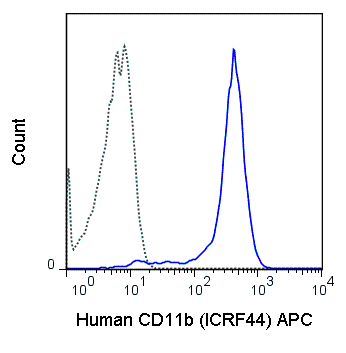
APC Anti-Human CD11b (ICRF44)
View Cart or Continue shopping.
Description
The ICRF44 antibody reacts with human CD11b, also known as integrin αalpha M. This 165-170 kDa cell surface glycoprotein is part of a family of integrin αreceptors that mediate adhesion between ≥ ≥ ≥ cells (cell-cell) and components of the extracellular matrix, e.g. fibrinogen (cell-matrix). In addition, integrin αs are active signaling receptors which recruit leukocytes to inflammatory sites and promote cell activation. Complete, functional integrin αreceptors consist of distinct combinations of integrin αchains which are differentially expressed. integrin αalpha M (CD11b) assembles with integrin αbeta-2 (CD18) into a receptor known as Macrophage Antigen-1 (Mac-1) or complement receptor type 3 (CR3). This receptor binds and induces intracellular signaling through ICAM-1, ICAM-2, ICAM-3 and ICAM-4 on endothelial cells and can also facilitate removal of iC3b bearing foreign cells.
The ICRF44 antibody is widely used as a marker for CD11b expression on macrophages, granulocytes, and subsets of NK cells. It is reported to be cross-reactive with a number of non-human species including Baboon, Chimpanzee, Cynomolgus, Rhesus and Swine.
| Name | APC Anti-Human CD11b (ICRF44) |
|---|---|
| Cat. No. | 20-0118 |
| Alternative Names | Mac-1, integrin ααM, Itgam, CR3 |
| Gene ID | 3684 |
| Clone | ICRF44 |
| Isotype | Mouse IgG1, kappa |
| Reactivity | Human |
| Cross Reactivity | Baboon, Chimpanzee, Cynomolgus, Rhesus, Swine |
| Format | APC |
| Application | Flow Cytometry |
